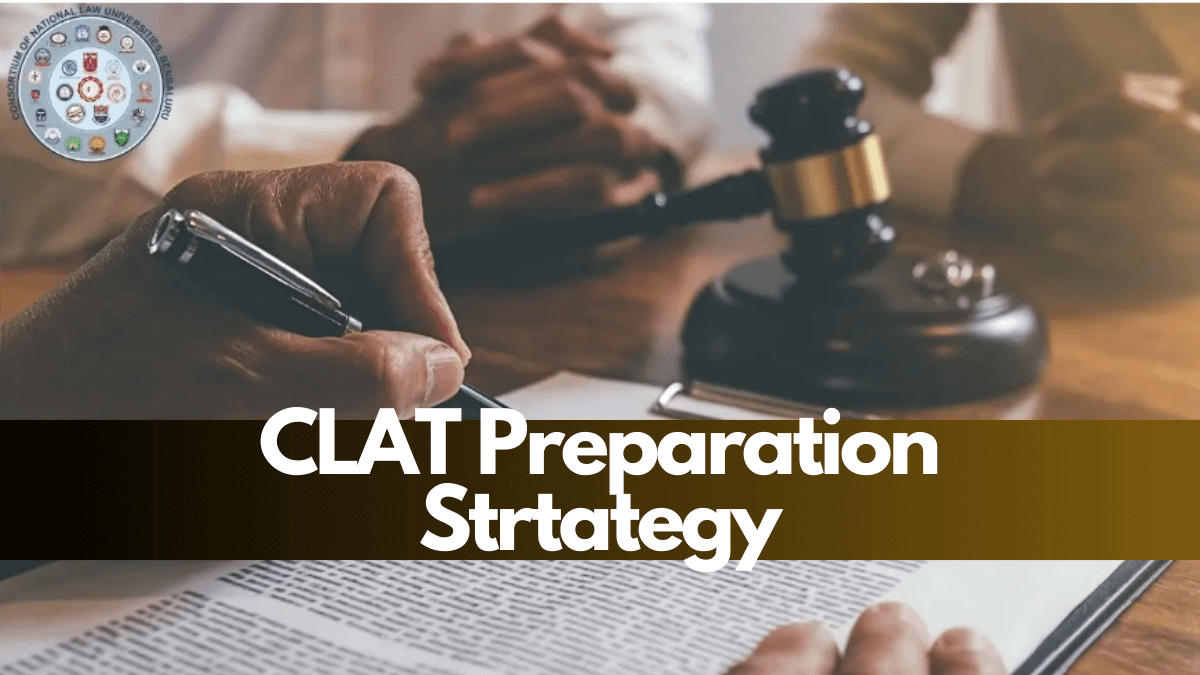The Consortium of National Law Universities (CNLU) will conduct the CLAT 2026 exam in the First Week of December 2026. With this, we are exactly 12 months away from the CLAT exam date. Beginners or droppers who are now thinking about whether they should start their prep now or later? The simple answer to this question is a big YES, this is the perfect time to plan your studies. The upcoming exam can be cracked from Zero level in the next 12 months, but for this, aspirants will have to follow the right set of strategies.
CLAT Preparation Strategy
Aspirants who are looking for how many months are required to prepare for the CLAT 2026 Exam are at the right spot. We can tell you with full assurance that follow our expert tips and you will be seated in one of the NLUs in 2026 in just 6 months of preparation. Applicants who are starting their CLAT Preparation or whose strategy didn’t work this year can use our 6 months preparation strategy to pass the exam with a good rank and get a seat in the prestigious NLU. If you are a laborious student and have already started your CLAT exam preparation, then the tips provided in this post will help you improve by rank by a huge margin.
CLAT Preparation Strategy 2026
The 6 months preparation strategy focuses equally on hard work and smart work. The strategy includes giving more focus on high weightage topics, studying and practicing the different subjects in different way, solving many PYQs and others. The highly competitive nature of the Common Law Admission Test (CLAT) makes it necessary for students to use expert advice and follow it religiously. We have first provided the month-wise preparation tips and then the subject-wise preparation strategy.
Prepare for CLAT without Coaching: Month-Wise Plan
Students should carefully go through the month-by-month study plan to be in a position to clear the CLAT exam after 6 months.
CLAT Exam Month 1 Preparation Strategy
The first month should be dedicated to building the foundational knowledge.
- First and foremost, familiarize yourself with the Latest CLAT Syllabus and CLAT exam Pattern. You should also understand the various sections that are tested, such as logical reasoning, legal reasoning, verbal ability, quantitative techniques, and current affairs. Review the CLAT Previous Year Question Papers, by knowing how many questions are asked from each section, you can better determine how much time to spend on each topic.
- Because it takes a lot of time and allows for revision, a study schedule is crucial. Creating a study routine would be greatly enhanced by being consistent and disciplined.
- Building a vocabulary that concentrates on terms like synonyms, antonyms, analogies, sentences, completion, or when one begins to understand the legal comprehensions and the major idea to get out of it is vital when starting to prepare for any of the parts stated. It would be very beneficial if you were familiar with the fundamental legal phrases and principles.
- However, one shouldn’t get to the point where they begin reading law school literature. Instead, one can acquire the fundamentals from a variety of online resources, artificial intelligence, and philosophy books. For applicants to become familiar with the various topics, introductory literature or internet resources would be ideal.
CLAT 2026 Month 2 Preparation Strategy
The 2nd month of the CLAT preparation should be reserved for studying and understanding the concepts. Along with that students should also practice questions based on the concepts studied. That may sound monotonous, but it’s crucial to start asking more tough questions and to have a deeper knowledge of the course material.
- Study a new topic from each subject on a daily basis. Answer five to ten questions and go over the five you answered incorrectly the day before. This will not only help you learn, but you will also be able to fix any mistakes you made repeatedly.
- Understanding the fundamental concepts will be crucial this month as there are five sections in the CLAT, ensuring that your solid base is prepared.
| Also Read | |
| CLAT Preparation Books | CLAT Marks vs Rank |
Month 3 Preparation Strategy for CLAT Exam
The third-month preparation strategy focuses on more hardcore study and practice of the questions.
- It is essential to read and understand the legal provisions related to each topic in third month. This will help students to answer the questions more accurately and confidently.
- Students should start giving mock tests from third month itself and analyze their performance and mistakes
- Start solving PYQs from all the subject sections.
CLAT Month 4 Preparation Strategy
Students should do rigorous practice of questions, and PYQs and work on their errors in the 4th month.
- You should have prepared your major concepts for practice by this month. To fully grasp the exam experience and analyze your performance after every test, I would advise signing up for a quality mock test. In order to provide you a comprehensive grasp of the test, this applies not only to one subject but to all five areas.
- You will doubt that participating in internet forums, receiving coaching, or talking about conception techniques with other class hopefuls or teachers will be helpful when you answer more and more questions and mocks.
- Giving up is not a good idea for an applicant; maintaining current general knowledge is crucial to getting the best possible grades in tests.
Month 5 Preparation Strategy for CLAT
In the fifth month you should focus on managing the exam like working on maintaining accuracy and time during the test.
- The candidate has completed questions, provided marks, and indicated which areas are poor and in need of significant development in addition to their excellent and bad points. It’s either logical thinking or the battle; concentrate and hone your exam techniques by identifying your areas of greatest error.
- You may have previously assigned one mock every week; however, you should now increase the frequency to two marks per week with weak radius, sectional analysis, and proper analysis. It will assist you in practicing time management for the CLAT and completing various parts in the shortest amount of time.
CLAT 6th Month Preparation Strategy
The final month should only be reserved for practice and more practice.
- Now that everything has been ready and completed, it’s time to combine all of the resources into one. Finish the revision and concentrate on getting ready. Control your tension. Revision is essential, so maintain your confidence.
It is advised that all candidates read the current events from January to April in a cursory manner. However, from May to November, reading the current events in incomplete detail and remaining up to date will give you an advantage because it requires less time and has a higher accuracy rate. - Consulting with one might be a preferable course of action. Having a mentor can help you allocate your time effectively, and when a static method is presented, it can be handled with ease.
- Find someone you can devote your attention to, and you’ll be able to identify the issues you’re searching for by their many names. Whether it’s a health professor, your brother, your parents, or someone else entirely, if you are under pressure, don’t let it break you. Instead, be calm and fight for what you want in the last month.
- Stress can affect your exam, so if you are in the final month of your preparation and are not getting enough sleep, eating poorly, or taking care of your mental health, it will have a psychological impact on the exam. Because tests are meant to test not only your skills and your ability to utilize reason, but also your capacity to remain composed.
- It would be preferable for everyone to watch documentaries, get enough sleep, read periodicals, watch TV news channels, and practice meditation. It makes all the difference to maintain a good outlook throughout this important stage.
| Also Read | |
| CLAT Online Coaching |
CLAT Mock Test Series |
CLAT 2026 Exam Preparation Strategy Subject-Wise
The different subject sections of the CLAT exam requires different strategy to conquer it. For this,we have provided the subject specific CLAT preparation strategies below.
How to Prepare for CLAT Logical Reasoning?
There are 23 to 26 problems in the CLAT logical reasoning portion. The CLAT Logical Reasoning section has a total weight of 20%. After reading a text of about 250 words, candidates will be required to answer multiple-choice questions (MCQs).
The CLAT Logical Reasoning section is one such area where applicants cannot risk failing because of their lack of experience. This section evaluates candidates’ analytical skills rather than their theoretical knowledge. It can only be mastered via a great deal of understanding and practice.
CLAT Logical Reasoning Important Topics
- Arrangements
- Syllogisms
- Number Series
- Blood Relations
- Statements and Assumptions
- Logical Sequences
- Arguments & Conclusions
- Seating Arrangement/Puzzle Test
- Assertions and Reasoning
- Puzzles
- Circular Arrangements
- Direct sense
- Analogies
- Connectives
- Clocks and calendars
- Coding Decoding
How to Prepare for CLAT 2026 Legal Reasoning?
The main concern among candidates getting ready for the CLAT exam is how to study for legal reasoning. We have developed some preparation advice for the CLAT Legal Reasoning portion in order to allay this worry. As this section evaluates the applicants’ critical thinking skills, it is crucial for candidates to have a solid foundation in political science, the Constitution, and the law. It is strongly advised that applicants reread past years’ CLAT question papers in addition to reading legal publications and news stories to gain a better understanding.
CLAT Legal Reasoning Important Topics
Since the CLAT Legal Reasoning Section has the largest weight in the exam, applicants should be familiar with the key concepts for CLAT Legal Reasoning Section. View the entire list by clicking the link below:
- Indian Constitution
- Important Acts and Amendments of the Legislature
- Current Affairs
- Legal Maxims
- Important Supreme Court Judgments
- Legal GK
| Also Read | |
| Time Management Tips for CLAT | How to Score 100+ in CLAT? |
CLAT Preparation Tips for GK
Candidates who intend to take the CLAT in 2026 should prepare for the current events section, which has a 25% weightage and incorporates general knowledge (GK), using the CLAT syllabus. To score higher in the exam, candidates need to maintain accuracy in the GK and Current Affairs portions in addition to the Legal Reasoning question.
Reading, reading, and more reading: Those who plan to take the CLAT exam shouldn’t be afraid to read. Reading respectable newspapers like The Statesman and The Hindu can help you stay up to date on current events.
Resources for Section of CLAT GK: To prepare for static GK, use resources such as Lucent’s General Knowledge and Tarun Goyal’s General Knowledge 2023–2024.
GK Important Topics
The CLAT Current Affairs and GK part will have questions on both static General Knowledge and Current Affairs, as the name implies. News articles, journalistic sources, and other non-fiction works will serve as the basis for the questions.
Important topics for static GK
- Art & Culture
- History
- Legal domain
Important Topics for Current Affairs
- Events in legal domain nationally or internationally of at least one year
- Major events happening internationally for at least the last year
- Major events happening nationally for at least the last year
CLAT Quantitative Techniques Preparation Plan
Though, to be honest, 90% of CLAT applicants find this section intimidating, it’s actually quite easy. Since it carries the least weight among the five components of the CLAT, most students likewise bypass it. That being said, you will be able to achieve decent scores and a spot at the top NLUs if you attempt this section. Still, let’s look at how to respond to inquiries about quantitative methods.
Important Topics for CLAT Quantitative Techniques
- ratio
- proportions
- Algebra
- profit and loss
- mensuration
CLAT Preparation Tips for English
The candidate’s proficiency with language in reading, comprehension, and grammar is assessed in the CLAT English section. The English language and comprehension portion of the syllabus is not extremely extensive, and candidates stand a good chance of scoring well.
CLAT English Important Topics
- Synonyms & Antonyms
- Tenses
- Spotting Grammatical Errors
- Active & Passive Voice
- Fill in the Blanks
- Vocabulary Words
- Correcting Incorrect Grammar Sentences
| Related Post | |
| CLAT Important Dates | CLAT Sample Paper |
| CLAT Cut off | CLAT Participating Colleges |











 CLAT Seats 2026: Check Latest CLAT Seat ...
CLAT Seats 2026: Check Latest CLAT Seat ...
 CLAT Books 2026: Check Subject-wise Best...
CLAT Books 2026: Check Subject-wise Best...
 CLAT Age Limit 2026 (Updated), Check All...
CLAT Age Limit 2026 (Updated), Check All...




